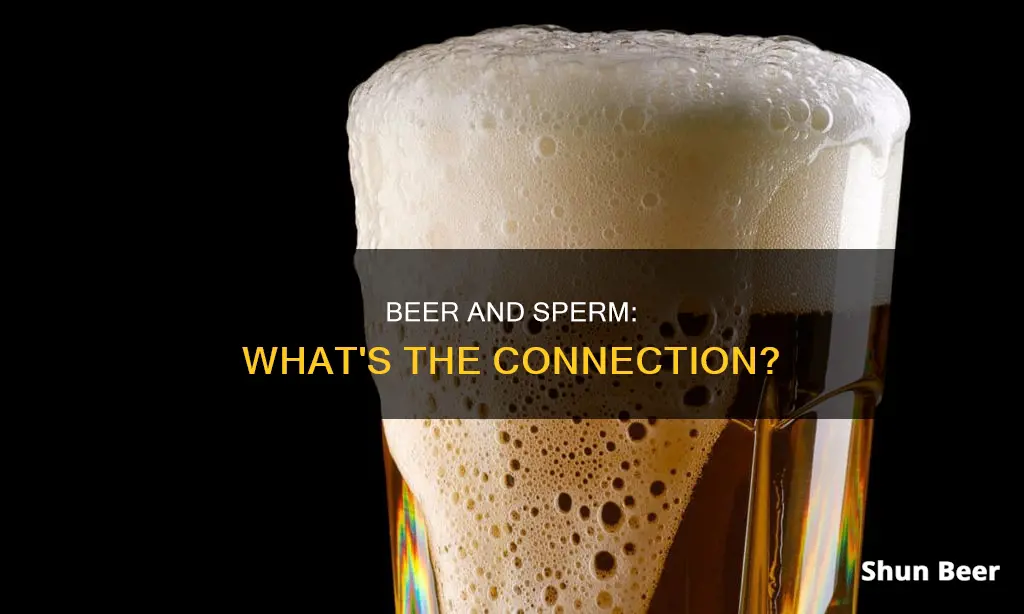
Alcohol consumption is common in the United States, with 56% of people over 18 drinking in the past month, according to the 2015 National Survey on Drug Use and Health. While moderate alcohol consumption may offer some health benefits, heavy drinking has been linked to numerous health issues, including liver disease, cancer, and dementia.
Heavy drinking has also been associated with negative effects on fertility in both men and women. In men, heavy drinking can lower testosterone levels, reduce sperm count, and cause early ejaculation. In women, alcohol can affect hormones and the menstrual cycle, making it harder to conceive.
Even moderate drinking may have an impact on fertility. A study of over 1,200 Danish men found that drinking five or more units of alcohol per week was associated with lower sperm quality. The effects were most apparent in men who drank 25 or more units each week. Interestingly, abstinence was also linked to poorer sperm quality, although the reason for this is unclear.
For those trying to conceive, reducing alcohol intake may be beneficial. The good news is that the effects of alcohol on sperm are reversible, with healthy sperm production returning within about three months of reduced drinking.
| Characteristics | Values |
|---|---|
| Number of drinks defined as binge drinking | 5 or more drinks in a few hours |
| One drink or one "unit" | 1/3 of an ounce of alcohol |
| Average number of units of alcohol consumed per week by participants in the Danish study | 11 |
| Number of units of alcohol consumed per week where negative effects on reproductive hormones and sperm quality were noticeable | 5 or more |
| Number of units of alcohol consumed per week where negative effects on reproductive hormones and sperm quality were most apparent | 25 or more |
| Equivalent of 25 or more units of alcohol per week | About 15 pints of beer |
| Number of units of alcohol consumed per week considered "safe" | Fewer than 5 |
What You'll Learn

Alcohol and sperm count
Alcohol is the most widely used recreational substance, and its effects on fertility are important to understand. Alcohol use is associated with multiple reproductive risks, including an increased risk of fetal loss, and decreased chance of live birth. It is also well-documented that alcohol abuse and acute intoxication are associated with sexual dysfunction, including issues with arousal and desire, as well as erectile and ejaculatory dysfunction.
The effects of alcohol on sperm count are complex and vary depending on the amount of alcohol consumed. The consensus is that heavy drinking has a negative impact on sperm count and quality. Binge drinking, defined as drinking a quantity of alcohol to raise the blood alcohol concentration (BAC) to 0.08 g/dL (typically 4 drinks for women and 5 drinks for men in 2 hours), has been shown to have negative effects on sperm. Studies have shown that more than 14 mixed drinks in a week can lower testosterone levels and affect sperm count.
However, the effects of low to moderate consumption of alcohol, such as up to 1 drink per day for women and up to 2 drinks per day for men, do not appear to be clinically significant. One study found no difference in any semen parameters in men who consumed more than 20 drinks per week compared to those who consumed 1-10 drinks per week. Another study of over 8,000 men found no difference in semen parameters and actually documented a linear increase in serum testosterone levels with increasing amounts of alcohol consumption.
The effects of alcohol on sperm count are reversible. One study showed it took three months for the return of healthy sperm production once alcohol consumption stopped.
It is recommended that men who drink heavily should be advised to decrease their alcohol intake. However, those who drink moderately should be counseled regarding alcohol consumption based on their overall health status, and not necessarily on reproductive health.
Antibiotics and Beer: A Safe Mix?
You may want to see also

Alcohol and testosterone levels
Alcohol can have a significant impact on testosterone levels, with the effects depending on the amount and frequency of consumption. Occasional and light to moderate drinking may lead to a slight increase in testosterone production. However, larger or more frequent alcohol consumption can have the opposite effect, resulting in reduced testosterone levels.
The Impact of Alcohol on Testosterone Levels
According to several studies, alcohol consumption, especially heavy drinking, can lower testosterone levels in the blood. This reduction in testosterone is caused by a decrease in the production rate and an increase in the breakdown and removal of testosterone from the blood. Alcohol interferes with the function of the hypothalamus, the anterior pituitary gland, and the testes, which are the key components of the male reproductive system.
The Role of Genetics
Genetics also plays a crucial role in the link between alcohol consumption and testosterone levels. A 2022 study on Korean men found that heavy drinkers who experienced facial flushing, a phenomenon with a genetic origin, had lower testosterone levels than non-drinkers. However, no significant difference was observed between non-drinkers and people who did not flush, regardless of their alcohol intake.
The Impact of Binge Drinking
Binge drinking, defined as consuming five or more drinks in a two-hour period for men, has been shown to negatively impact testosterone levels and overall male fertility. Excessive drinking, as defined by the CDC, includes consuming more than 14 mixed drinks per week, which can lead to lower testosterone levels and reduced sperm count.
Reversing the Effects of Alcohol on Testosterone
While research on reversing alcohol-related low testosterone is ongoing, generic treatments for low testosterone may be effective. These treatments include eliminating opioid use, losing weight, and improving sleep habits. If these interventions do not help, testosterone replacement therapy (TRT) may be necessary, but it should be carefully monitored by a doctor.
Ginger Beer: A Standalone Beverage?
You may want to see also

Alcohol and sperm morphology
Alcohol has been shown to have a negative impact on sperm morphology. Studies have shown that alcohol consumption can cause a decrease in the number of spermatozoa with normal morphology and an increase in irreversible tail defects. The more alcohol consumed, the more likely a decrease in normal sperm morphology.
Alcohol consumption can also cause a decrease in the percentage of progressive motility, straight-line velocity, and curvilinear velocity of sperm.
In addition to the direct effects of alcohol on sperm morphology, alcohol consumption can also indirectly affect sperm morphology by causing liver dysfunction, which can result in hormonal disturbances due to the inability to metabolize estrogens.
Chronic alcohol consumption has also been associated with decreased gonadotropin release, testicular atrophy, and decreased testosterone and sperm production. Alcohol abuse is also associated with sexual dysfunction, including issues with arousal and desire, as well as erectile and ejaculatory dysfunction, all of which could lead to difficulties in conceiving.
The effects of alcohol on sperm morphology are reversible, with one study showing a return to healthy sperm production within three months of discontinuing alcohol consumption.
Beer and Workouts: Friends or Foes?
You may want to see also

Alcohol and erectile dysfunction
Alcohol can negatively impact sexual health and cause erectile dysfunction (ED). ED is the inability to get or keep an erection. Alcohol can interfere with the messengers in the brain that tell the penis to fill with blood. It can also reduce the production of testosterone, the hormone that controls male sexual functions.
Chronic and persistent alcohol use is known to induce sexual dysfunction, including erectile dysfunction. The amount of alcohol consumed appears to be the most significant predictor of developing sexual dysfunction. The more alcohol consumed, the higher the risk of developing sexual dysfunctions.
Alcohol abuse is the leading cause of impotence and other disturbances in sexual dysfunction. Episodic erectile failure in alcoholic men is fairly routine, and is found to be significantly higher in men consuming more than three standard units of alcohol (12 g ethanol) daily.
In addition to erectile dysfunction, alcohol consumption can also lead to a loss of libido and infertility in both men and women. Alcohol can affect fertility by altering sperm count, size, shape, and motility. It can also cause early ejaculation or decreased ejaculation.
The good news is that the effects of alcohol on sexual health and fertility are reversible. Studies have shown that it takes about three months for healthy sperm production to return once alcohol consumption stops.
Beer: A Friend or Foe for Passing Kidney Stones?
You may want to see also

Alcohol and sleep
Alcohol can have a significant impact on sleep patterns, with even a couple of drinks affecting sleep quality. Alcohol disrupts the sleep cycle, reducing the time spent in the important REM stage of sleep. As a result, you may wake up feeling less refreshed and tired the next day.
Alcohol is initially sedating, acting as a depressant on the central nervous system. However, this effect wears off after a few hours, leading to disrupted and poor-quality sleep later in the night. This can cause frequent wakings, leaving you feeling tired and sluggish the next day.
The more alcohol consumed, and the closer to bedtime it is consumed, the stronger its effects will be. It is recommended to avoid alcohol at least three hours before bed.
Alcohol can also contribute to snoring and sleep apnoea, a condition that narrows airways and can cause breathing problems during sleep. Sleep apnoea can lead to serious health issues such as type 2 diabetes, depression, high blood pressure, and an increased risk of stroke.
Heavy alcohol consumption can also lead to chronic sleep problems and disorders such as insomnia and sleep apnoea.
Beer and Warfarin: Is It Safe to Drink?
You may want to see also
Frequently asked questions
Yes, drinking beer can affect sperm count. Research shows that drinking alcohol can lower testosterone production, reduce libido, and make it harder to get and maintain an erection.
Yes, drinking beer can cause infertility in both men and women. In men, heavy drinking can lower testosterone levels, reduce sperm count, and cause impotence. In women, drinking alcohol can affect hormones and the menstrual cycle, making it harder to conceive.
Studies show that heavy, consistent drinking or binge drinking (more than five drinks in a two-hour time frame for men) has negative effects on sperm. More than 14 mixed drinks in a week can lower testosterone levels and affect sperm count.
Yes, drinking beer can affect sperm motility. Alcohol can alter the shape, size, and movement of healthy sperm, reducing their ability to swim and reach the egg.
Yes, drinking beer can affect male fertility. Alcohol can lower testosterone levels, reduce sperm count and quality, and cause erectile dysfunction, making it harder to conceive.







